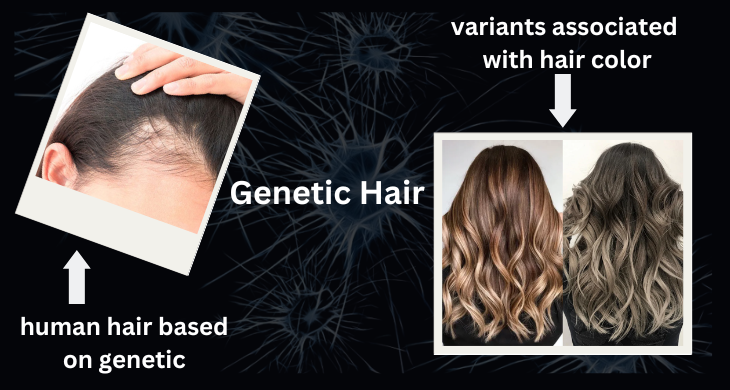Unraveling the Genetic Factors Behind Hair Diversity and Its Implications for Health and Disease

Introduction
Hair is not just a superficial aspect of our appearance; it holds profound genetic insights. Our locks come in a myriad of colors, textures, and patterns, making each individual’s hair unique. Have you ever wondered why some people have curly hair while others have straight hair? Or why certain individuals are born with vibrant red hair while others have rich brown or blonde shades? The answers lie within our genes.
In this article, we will delve into the world of hair genetics, exploring how scientists categorize human hair based on genetic factors. By deciphering the genetic variants associated with hair color, texture, and other characteristics, researchers can gain a deeper understanding of the genetic basis of hair diversity. Furthermore, this knowledge opens doors to potential implications for human health and disease.
Categorize Human Hair Based on Genetic Factors
Human hair is a complex trait influenced by various genetic factors. Through extensive research, scientists have identified several genetic variants associated with hair color, texture, and other attributes. Let’s explore these categories in detail:
- Hair Color Genetic Variants – Unveiling the Shades of Diversity
- Melanin and Hair Pigmentation
- The MC1R Gene: Redheads and Beyond
- The Eumelanin vs. Pheomelanin Balance
- Hair Texture Genetic Variants – The Twist and Turns
- The Role of Keratin Proteins
- The Influence of Genetic Mutations on Hair Texture
- Curly Hair, Straight Hair, and Everything In-between
- Hair Thickness Genetic Variants – The Volume Chronicles
- Hair Shaft Diameter and Density
- The WNT10A Gene and Hair Thickness
- Genetic Factors Influencing Hair Volume
- Hair Shape Genetic Variants – The Curls, Waves, and Coils
- Understanding Hair Follicle Shape
- Genetic Influences on Hair Shape
- The Impact of Specific Genes on Hair Curliness
- Hair Growth Genetic Variants – The Lengthening Mysteries
- The Anagen, Catagen, and Telogen Phases
- Genes Associated with Hair Growth Rate
- Genetic Factors Affecting Hair Loss and Baldness
- Hair Density Genetic Variants – The Covering Calculations
- Hair Follicle Distribution Patterns
- The Role of WNT5A in Hair Density
- Genetic Determinants of Hair Thickness
- Hair Resilience Genetic Variants – The Strength Within
- Understanding Hair Fiber Strength
- Genes Associated with Hair Resilience
- Genetic Factors Affecting Hair Breakage and Damage
- Hair Pattern Genetic Variants – The Whorls and Partings
- The Development of Hair Patterns
- Genetic Influences on Hair Whorls
- Unraveling the Genetic Basis of Hair Partings
- Hair Graying Genetic Variants – The Silver Strands
- The Science Behind Hair Graying
- Genes and Enzymes Associated with Graying
- Genetic Factors Influencing Premature Graying
- Hair Sensitivity Genetic Variants – The Tender Tresses
- Understanding Hair Sensitivity
- Genes Linked to Hair Sensitivity
- Genetic Factors Contributing to Hair Damage and Allergies
Frequently Asked Questions(FAQ)
- Q: Is hair color determined solely by genetics?
- Hair color is primarily influenced by genetics, specifically genetic variants associated with pigmentation. However, environmental factors can also have a minor impact on hair color.
- Q: Can genetic variants affect hair loss?
- Yes, certain genetic variants can contribute to hair loss and baldness. Factors like androgen sensitivity & hormonal imbalances play a role in this process.
- Q: Are there specific genes responsible for curly hair?
- Yes, genetic variants in genes such as the trichohyalin (TCHH) gene and the KRT75 gene have been linked to curly hair.
- Q: Can genetic factors contribute to premature graying?
- Yes, genetic variants in genes like the IRF4 gene and the PRSS53 gene have been associated with premature graying of hair.
- Q: Is it possible to alter hair texture through genetic modification?
- While genetic modification is an area of scientific research, it is not currently possible to alter hair texture through genetic interventions.
- Q: Are there any health implications associated with specific hair characteristics?
- Certain hair characteristics, such as hair thickness or hair sensitivity, may have implications for scalp health and hair care routines. However, more research is needed to establish definitive connections.
Conclusion
Categorizing human hair based on genetic factors provides a deeper understanding of the intricate genetic basis of hair diversity. By unraveling the genetic variants associated with hair color, texture, & other characteristics, researchers can shed light on the mysteries of our locks. Furthermore, this knowledge holds potential implications for human health and disease, offering insights into conditions like hair loss, scalp disorders, and even certain genetic syndromes.
As we continue to explore the fascinating world of genetics, our understanding of hair genetics will undoubtedly expand, unlocking further discoveries. So next time you marvel at the diversity of hair around you, remember that beneath those strands lie the intricacies of our genetic code.
